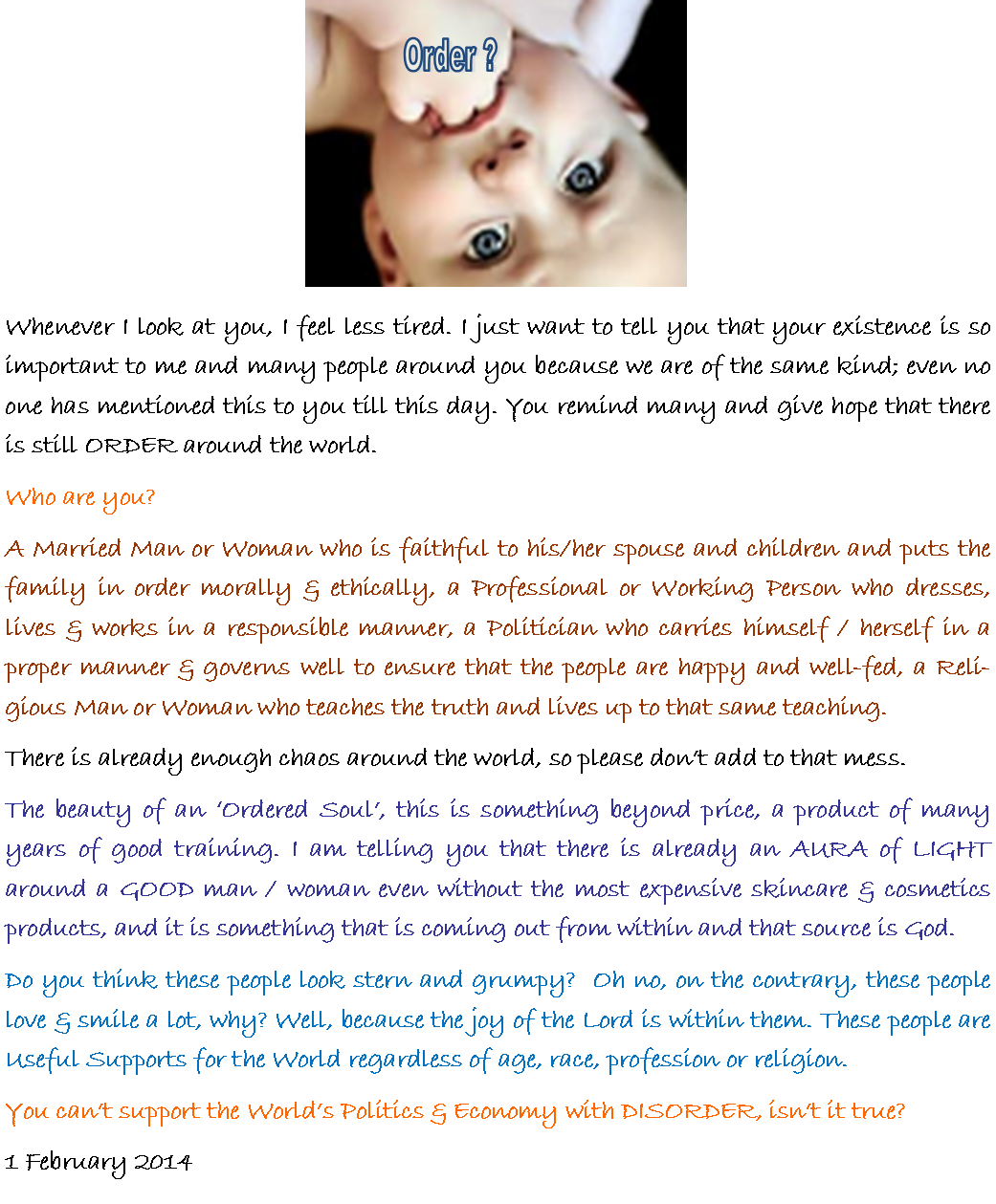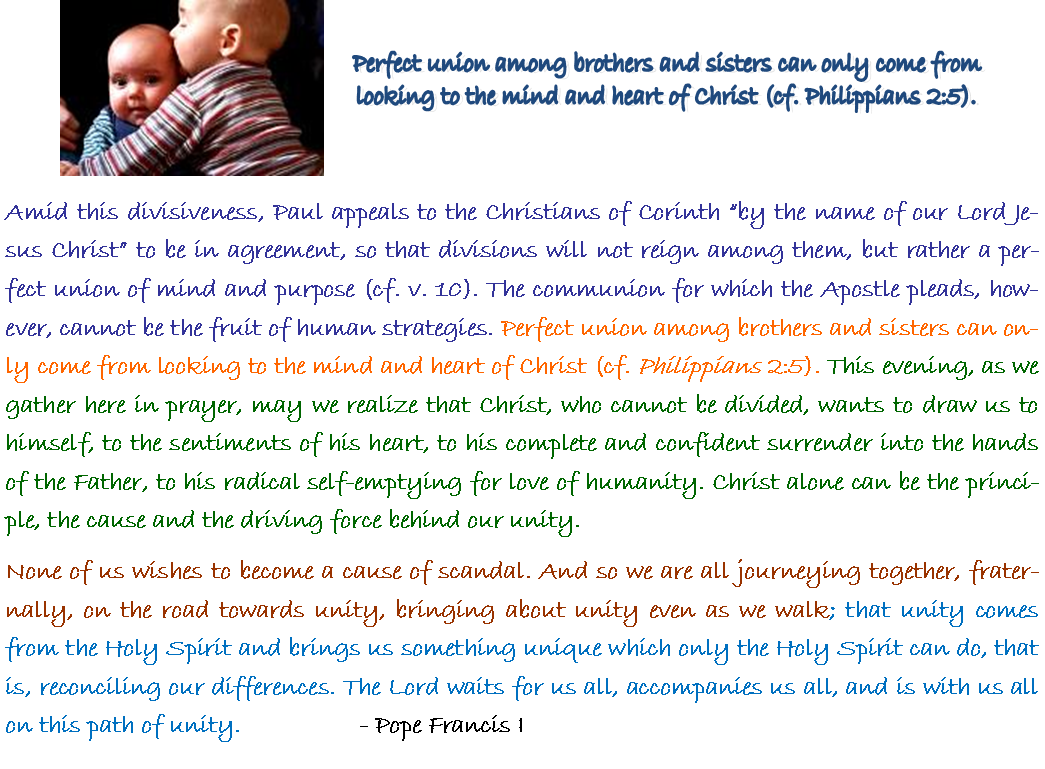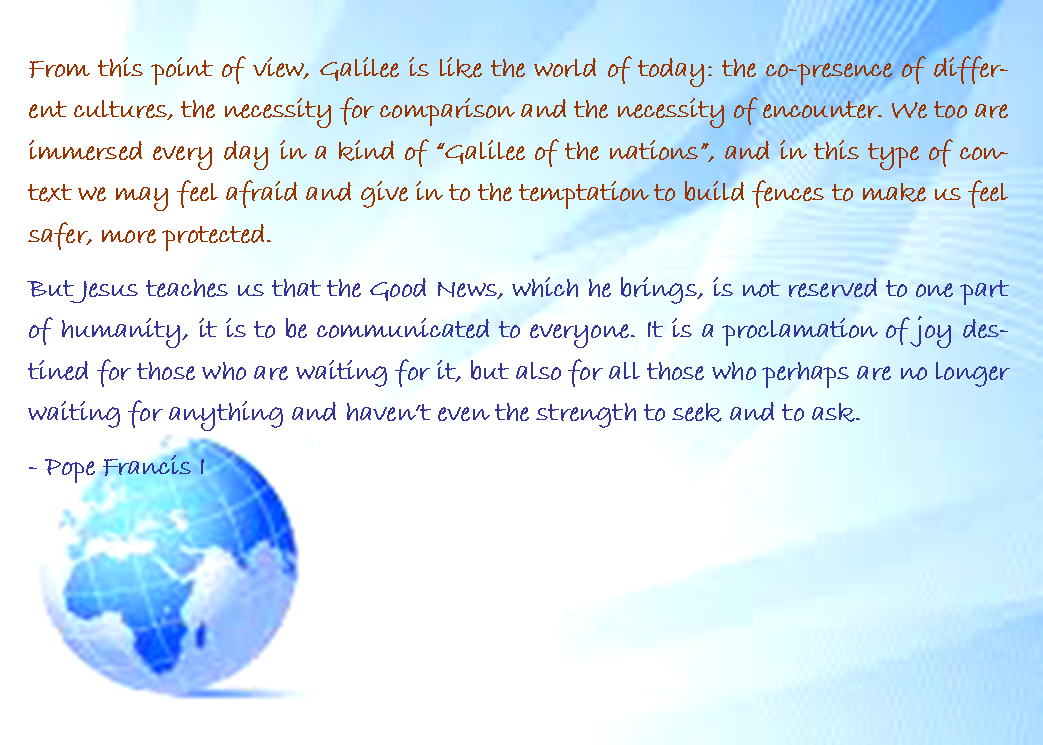|
122 |

|
POPE FRANCIS ANGELUS Saint Peter's Square
Dear Brothers and Sisters, Good morning!
This Sunday’s Gospel recounts the beginnings of the public life of Jesus in the cities and villages of Galilee. His mission does not begin in Jerusalem, the religious centre and also the social and political centre, but in an area on the outskirts, an area looked down upon by the most observant Jews because of the presence in that region of various foreign peoples; that is why the Prophet Isaiah calls it “Galilee of the nations” (Isaiah 9:1).
It is a borderland, a place of transit where people of different races, cultures, and religions converge. Thus Galilee becomes a symbolic place for the Gospel to open to all nations. From this point of view, Galilee is like the world of today: the co-presence of different cultures, the necessity for comparison and the necessity of encounter. We too are immersed every day in a kind of “Galilee of the nations”, and in this type of context we may feel afraid and give in to the temptation to build fences to make us feel safer, more protected. But Jesus teaches us that the Good News, which he brings, is not reserved to one part of humanity, it is to be communicated to everyone. It is a proclamation of joy destined for those who are waiting for it, but also for all those who perhaps are no longer waiting for anything and haven’t even the strength to seek and to ask. Starting from Galilee, Jesus teaches us that no one is excluded from the salvation of God, rather it is from the margins that God prefers to begin, from the least, so as to reach everyone. He teaches us a method, his method, which also expresses the content, which is the Father’s mercy. “Each Christian and every community must discern the path that the Lord points out, but all of us are asked to obey his call to go forth from our own comfort zone in order to reach all the ‘peripheries’ in need of the light of the Gospel” (Apostolic Exhortation, Evangelii Gaudium, n. 20).
Jesus begins his mission not only from a decentralized place, but also among men whom one would call, refer to, as having a “low profile”. When choosing his first disciples and future apostles, he does not turn to the schools of scribes and doctors of the Law, but to humble people and simple people, who diligently prepare for the coming of the Kingdom of God. Jesus goes to call them where they work, on the lakeshore: they are fishermen. He calls them, and they follow him, immediately. They leave their nets and go with him: their life will become an extraordinary and fascinating adventure.
Dear friends, the Lord is calling today too! The Lord passes through the paths of our daily life. Even today at this moment, here, the Lord is passing through the square. He is calling us to go with him, to work with him for the Kingdom of God, in the “Galilee” of our times. May each one of you think: the Lord is passing by today, the Lord is watching me, he is looking at me! What is the Lord saying to me? And if one of you feels that the Lord says to you “follow me” be brave, go with the Lord. The Lord never disappoints. Feel in your heart if the Lord is calling you to follow him. Let’s let his gaze rest on us, hear his voice, and follow him! “That the joy of the Gospel may reach to the ends of the earth, illuminating even the fringes of our world” (ibid., n. 288).
Continue next page ...
9 February 2014 |


|
CELEBRATION OF VESPERS ON THE SOLEMNITY HOMILY OF POPE FRANCIS Basilica of St. Paul Outside-the-Walls
“Has Christ been divided?” (1 Corinthians 1:13). The urgent appeal which Saint Paul makes at the beginning of his First Letter to the Corinthians, and which has been proclaimed at this evening’s liturgy, was chosen by a group of our fellow Christians in Canada as the theme for our meditation during this year’s Week of Prayer.
The Apostle was grieved to learn that the Christians of Corinth had split into different factions. Some claimed: “I belong to Paul”; while others claimed: “I belong to Apollos” or “I belong to Cephas”, and others yet claimed: “I belong to Christ” (cf. v. 12). Paul could not even praise those who claimed to belong to Christ, since they were using the name of the one Saviour to set themselves apart from their other brothers and sisters within the community. In other words, the particular experience of each individual, or an attachment to certain significant persons in the community, had become a yardstick for judging the faith of others.
Amid this divisiveness, Paul appeals to the Christians of Corinth “by the name of our Lord Jesus Christ” to be in agreement, so that divisions will not reign among them, but rather a perfect union of mind and purpose (cf. v. 10). The communion for which the Apostle pleads, however, cannot be the fruit of human strategies. Perfect union among brothers and sisters can only come from looking to the mind and heart of Christ (cf. Philippians 2:5). This evening, as we gather here in prayer, may we realize that Christ, who cannot be divided, wants to draw us to himself, to the sentiments of his heart, to his complete and confident surrender into the hands of the Father, to his radical self-emptying for love of humanity. Christ alone can be the principle, the cause and the driving force behind our unity.
As we find ourselves in his presence, we realize all the more that we may not regard divisions in the Church as something natural, inevitable in any form of human association. Our divisions wound Christ’s body, they impair the witness which we are called to give to him before the world. The Second Vatican Council’s Decree on Ecumenism, appealing to the text of Saint Paul which we have reflected on, significantly states: “Christ the Lord founded one Church and one Church only. However, many Christian communities present themselves to people as the true inheritance of Jesus Christ; all indeed profess to be followers of the Lord but they differ in outlook and go their different ways, as if Christ were divided”. And the Council continues: “Such division openly contradicts the will of Christ, scandalizes the world, and damages the sacred cause of preaching the Gospel to every creature” (Unitatis Redintegratio, 1). We have all been damaged by these divisions. None of us wishes to become a cause of scandal. And so we are all journeying together, fraternally, on the road towards unity, bringing about unity even as we walk; that unity comes from the Holy Spirit and brings us something unique which only the Holy Spirit can do, that is, reconciling our differences. The Lord waits for us all, accompanies us all, and is with us all on this path of unity.
Christ, dear friends, cannot be divided! This conviction must sustain and encourage us to persevere with humility and trust on the way to the restoration of full visible unity among all believers in Christ. Tonight I think of the work of two great Popes: Blessed John XXIII and Blessed John Paul II. In the course of their own lives, both came to realize the urgency of the cause of unity and, once elected Bishops of Rome, they guided the entire Catholic flock decisively on the paths of ecumenism. Pope John blazed new trails which earlier would have been almost unthinkable. Pope John Paul held up ecumenical dialogue as an ordinary and indispensable aspect of the life of each Particular Church. With them, I think too of Pope Paul VI, another great promoter of dialogue; in these very days we are commemorating the fiftieth anniversary of his historic embrace with the Patriarch Athenagoras of Constantinople.
The work of these, my predecessors, enabled ecumenical dialogue to become an essential dimension of the ministry of the Bishop of Rome, so that today the Petrine ministry cannot be fully understood without this openness to dialogue with all believers in Christ. We can say also that the journey of ecumenism has allowed us to come to a deeper understanding of the ministry of the Successor of Peter, and we must be confident that it will continue to do so in the future. As we look with gratitude to the progress which the Lord has enabled us to make, and without ignoring the difficulties which ecumenical dialogue is presently experiencing, let us all pray that we may put on the mind of Christ and thus progress towards the unity which he wills. And to journey together is already to be making unity!
In this climate of prayer for the gift of unity, I address a cordial and fraternal greeting to His Eminence Metropolitan Gennadios, the representative of the Ecumenical Patriarch, and to His Grace David Moxon, the representative in Rome of the Archbishop of Canterbury, and to all the representatives of the various Churches and Ecclesial Communities gathered here this evening. With these two brothers representing everyone, we have prayed at the Tomb of Paul and have said to one another: “Let us pray that he will help us on this path, on this path of unity and of love, as we advance towards unity”. Unity will not come about as a miracle at the very end. Rather, unity comes about in journeying; the Holy Spirit does this on the journey. If we do not walk together, if we do not pray for one another, if we do not collaborate in the many ways that we can in this world for the People of God, then unity will not come about! But it will happen on this journey, in each step we take. And it is not we who are doing this, but rather the Holy Spirit, who sees our goodwill.
Dear brothers and sisters, let us ask the Lord Jesus, who has made us living members of his body, to keep us deeply united to him, to help us overcome our conflicts, our divisions and our self-seeking; and let us remember that unity is always better than conflict! And so may he help us to be united to one another by one force, by the power of love which the Holy Spirit pours into our hearts (cf. Romans 5:5). Amen. |
